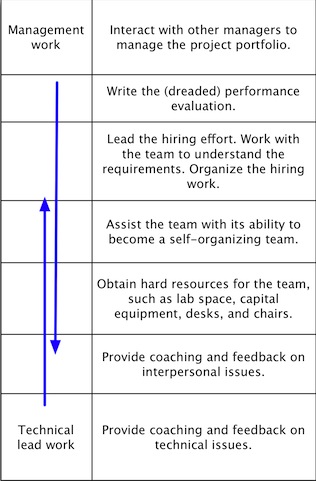Managing requires a different skill set from technical work, yet many companies promote their best technical workers to management positions. Here are some things to consider when it's time to promote your technical workers.
“I need a little breathing room in my group,” Carl said to Steve. “I have fifteen people reporting directly to me, and you and I both know that’s way too many. I need to promote somebody, but I’m having a little trouble deciding who to promote.” Carl shook his head as he looked at his org chart. “You’re a director. You have plenty of experience promoting people, right? What should I do?”
“You should do what I do,” said Steve. “Take the most talented technical person and make that person the manager. Then, you know you have the best person for the job.”
Carl almost spat his coffee. “You’re not serious, are you? You know what happened when we promoted Nancy a year ago. And that ended after a month. We had a revolt on our hands! All she can think about is databases. Little endians, big endians, cardinality, rows, joins—you name it. She was a disaster as a manager, and she didn’t even want the management position. She wanted a promotion, but to be a principal or consulting engineer, not a manager.
“No, we need a way to think about the kind of person the manager has to be and then think about who would fill that role. Remember, once we promote someone, we lose the technical work that person performs. We need to make sure we get the management work. Maybe we should ask if anyone wants to be a manager.”
“Who would want to be a manager?” Steve asked.
“Well, I like managing. I told you that I wanted to be a technical manager when you and I had our first one-on-one a while ago.”
“Oh, that’s right. I forgot.”
“Do you like being a middle manager?”
“Well, I like setting the strategy, and I like making sure that our projects get done. I like making the project portfolio decisions, but sometimes I miss the technology. I wonder if I’m too far away from the technology now. I’m not a senior manager, and I’m not a first-line manager. I find middle management difficult sometimes.”
“Well, you’re honest.”
“That, I am. OK, let’s talk about your people more seriously. Do you need more of a catalyst—a cattle prod?” Steve laughed.
“No. Nobody needs a cattle prod. I think we need to look at the qualities, preferences, and non-technical skills more. It’s time to do a job analysis for the management position. Then, I think I’ll ask the people in my group if anyone wants the job. I probably should have been grooming people as part of a succession plan all along. It’s too late for that now, but I do know that we don’t need the best technical person.”
Management Skills Are Different from Technical Skills
Managers perform different work than technical people do. They require different skills. Managers deliver different value to the organization. It never makes sense to me when the best technical person is promoted into management. That deprives the organization of a great technical person and, worse, can create a terrible manager.
We need to recognize that there are two different career paths for technical people: technical and managerial. When management wants to reward technical people with more money, it’s critical that those technical people do not automatically get a management promotion. They need a technical promotion.
What Do First-line Managers Do?
Sometimes, it’s difficult to tell the difference between a first-line manager and a technical lead. There is no standard for what each person might do, and each organization is different. However, figure 1 shows what I see as the big differences between technical and management work.

Figure 1: The continuum of technical lead work to management work
Your technical lead position may be limited to providing coaching and feedback on only the technical issues. I don’t mean that as a negative thing. For many technical leads, that’s an enormous job. To do more would be overwhelming, especially if there are four or more people on the team.
And, some technical leads do more than that, operating much more in the management realm. Some technical leads do everything up to writing performance evaluations and managing the project portfolio. In my opinion, they have become managers by then. If you look at the qualities, preferences, and non-technical skills required to perform the work, as well as the value that they provide on a daily basis, their overall value to the company is managerial, not technical.
What’s the Value of the Work?
No matter what job you have or what job you are looking to fill, always ask yourself this question: What is the value of the work that the person filling that job will provide?
A long time ago, in a company far away, a colleague, Beryl took a new job as the director of software quality. She discovered she was desperately in need of technical leaders. Here is Beryl’s story:
I was once a director of software quality at a company where we had fifteen testers and three performance engineers. My predecessor had not hired enough automation people, and only two of the fifteen people had automation experience and capability. Our customers wanted faster releases and more product speed. We were in trouble. We could diagnose the problems, thanks to our performance engineers, but we couldn’t provide feedback fast enough to our developers. We didn’t have the talent in our test group. What could we do? One of my testers was a very sharp guy who knew the code base inside and out. I asked him if he wanted to be a technical lead, not a manager. I wanted someone who could lead the test automation effort, so we could provide better feedback to the developers. I didn’t need help with management; I needed help with automation. Once I explained how valuable the job was, he happily said yes. Then, I had to get HR to understand how valuable the job was and to pay him for it. That was a different problem.
Technical leads fill necessary roles that are not management roles in the organization.
Managers Work Outside the Team
Managers expand their influence outside the team, as well as upwards and across management. Technical leads and technical people tend to use their influence within the team and across technical teams. They use their influence less often with management. While negotiation and influence skills may be necessary for both, what’s important to technical people is not going to be important to other managers.
Promoting a great technical person into a management position may handicap that person for influence and negotiation—unless that person has great empathy and rapport-building skills or wants to develop those skills. And, I don’t know about you, but I didn’t get into software because I had great empathy and rapport-building skills. I’ve worked to develop them over the years.
Great Technical People Can Be Great Managers
Don’t get me wrong. Great technical people can be terrific managers if they want to be. I suggest asking people if they want to be managers before you promote them. Sometimes, when people want a promotion, they want a technical promotion, not a managerial promotion. So, ask first.
Make sure you know the difference between a technical lead and a manager, and know which one you’re asking the promoted person or new hire to be. Maybe your set of activities is different from my proposed set. That’s fine. Clarify the expectations for any role. Just don’t assume that the best person for the job is the best technical person.
Read more of Johanna's management myth columns here:
- The Myth of 100% Utilization
- Only the 'Expert' Can Perform This Work
- We Must Treat Everyone the Same Way
- I Don't Need One-on-ones
- We Must Have an Objective Ranking System
- I Can Save Everyone
- I Am Too Valuable to Take a Vacation
- I Can Still Do Significant Technical Work
- We Have No Time for Training
- I Can Measure the Work by the Time People Spend at Work
- The Team Needs a Cheerleader!
- I Must Promote the Best Technical Person to Be a Manager
- I Must Never Admit My Mistakes
- I Must Always Have a Solution to the Problem
- I Know How Long the Work Should Take
- I Must Solve the Team’s Problem for Them
- I Can Move People Like Chess Pieces
- Management Doesn’t Look Difficult From the Outside, So It Must Be Easy
- I Can Compare Teams (and It’s Valuable to Do So)
- It’s Always Cheaper to Hire People Where the Wages Are Less Expensive
- If You’re Not Typing, You’re Not Working
- You Can Manage Any Number of People as a Manager
- People Don’t Need External Credit
- Performance Reviews Are Usefult
- It's Fine to Micromanage
- We Can Take Hiring Shortcuts
- I Can Standardize How Other People Work
- I Can Concentrate on the Run
- I Am More Valuable than Other People
- I Don’t Have to Make the Difficult Choices
- I Can Treat People as Interchangeable Resources
- We Need a Quick Fix or a Silver Bullet
- You're Empowered Because I Say You Are
- Friendly Competition Is Constructive
- You Have an Indispensable Employee

